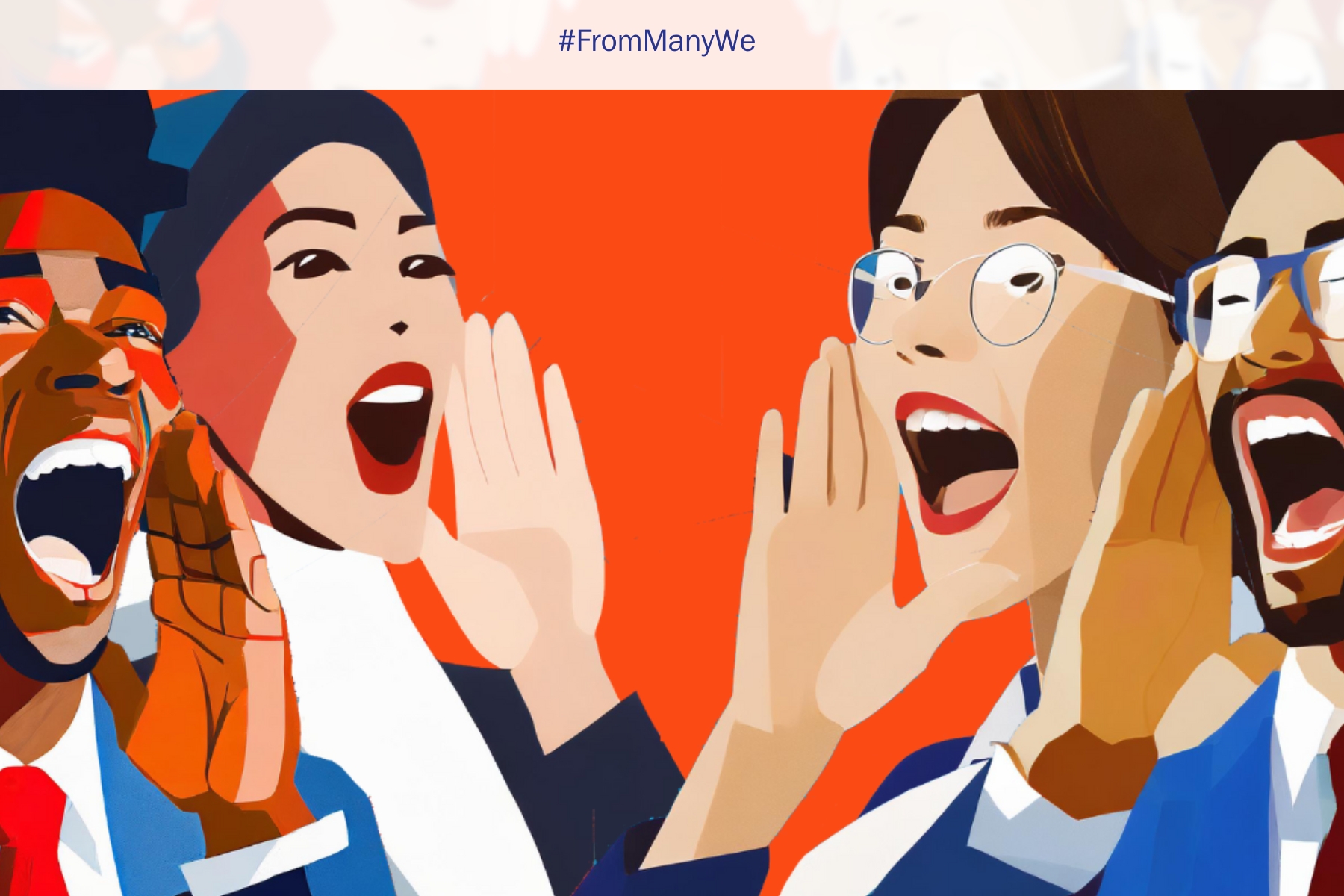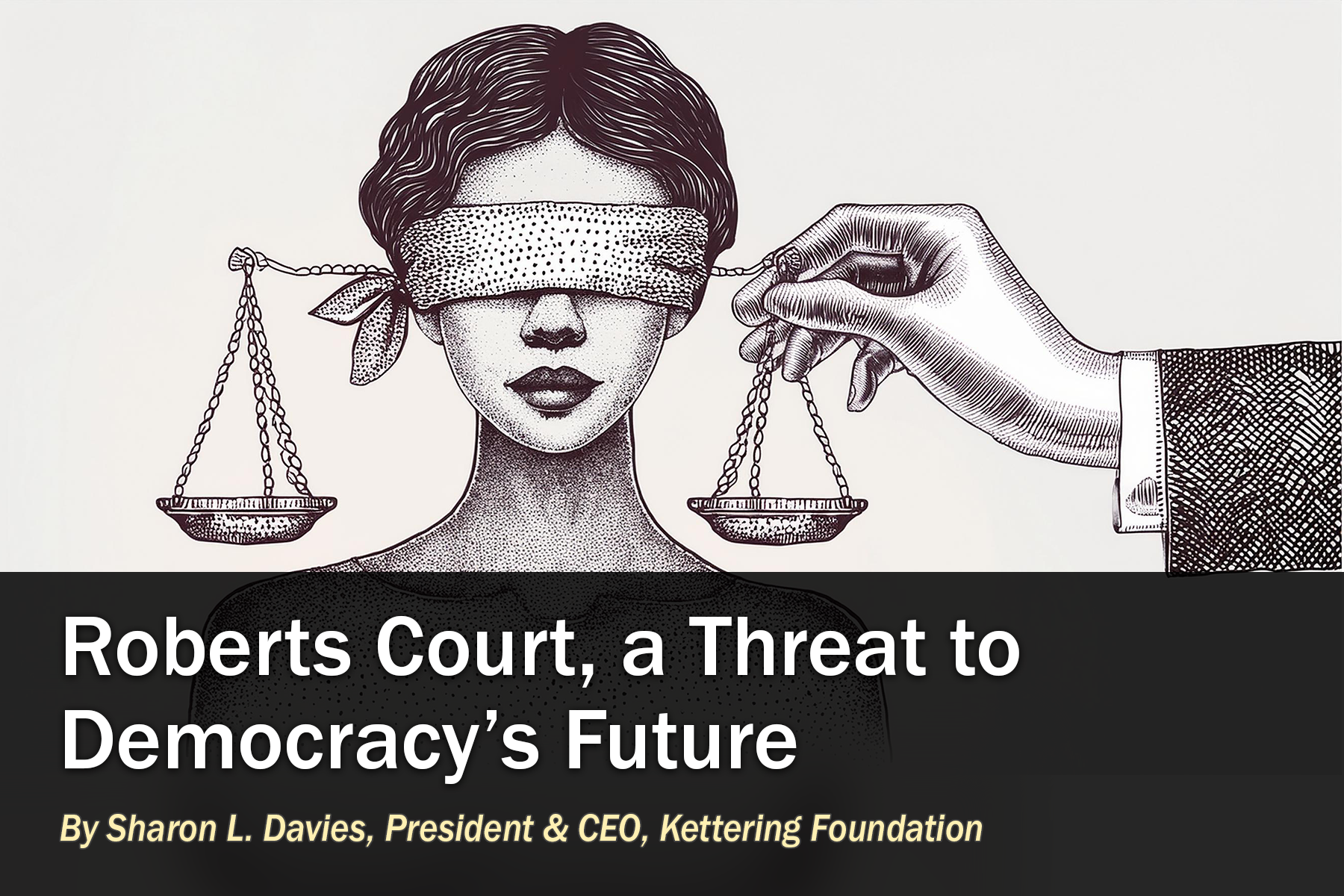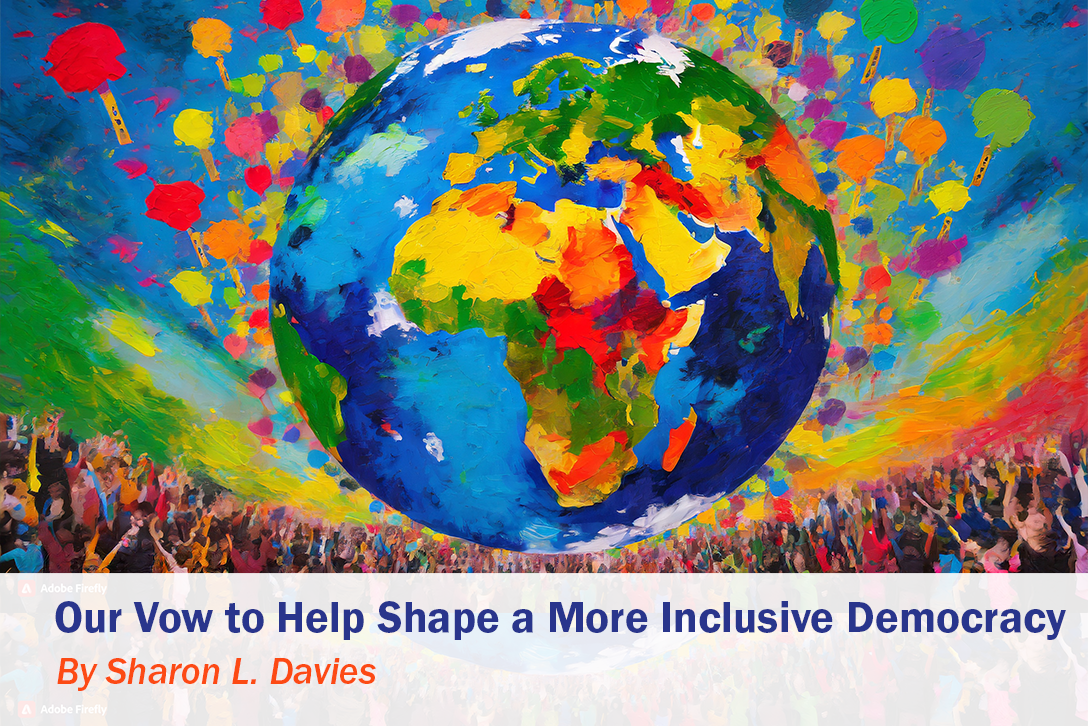A Few Thoughts on Democracy

Sharon Davies made these remarks on April 12 during her first Dayton Days meeting as president and CEO of the Kettering Foundation.
It is a pleasure to be able to be with the Dayton Days group for the first time. This is Day Eight as Kettering’s new President and CEO for me. The learning curve is steep at the moment, but I am taking some comfort from the fact that Kettering staff who have been here for three years sometimes still describe themselves as “new,” which I am interpreting to mean that I have some leeway.
I thought I would share some additional information about myself to convey why the work of the Kettering Foundation has such great meaning to me personally, as a citizen.
As we all know, democracy in the United States has evolved over the course of our nation’s history. Indeed, at times, the claim that our system was a democratic one was more of an idea than a reality. An idea that all citizens would enjoy the equal right and opportunity to engage in the shaping of their communities and the equal right and opportunity to hold their representatives accountable to the public will. At the founding of our nation, the power to participate in acts of self-governance was narrowly cabined. Left without if you were a man, but unpropertied. If you were a woman. If you were a person of color. At the time of the nation’s founding in 1776, and later the ratification of our Constitution in 1787, the stirring words of the Declaration of Independence and the beginning clause of the Constitution described what a democracy might look like if we lived up to the aspirations they set forth.
All men are created equal, that they are endowed by their Creator with certain unalienable rights, that among these are Life, Liberty and the Pursuit of happiness.
If we ignore the express gender constraint in that sentence for the moment, the Declaration at least used the word all.
And from the Constitution:
We the People secure the Blessings of Liberty to ourselves and our Posterity, do ordain and establish this Constitution for the United States of America.
It was “the people,” our Constitution said, who secured those blessings for ourselves and our posterity. Thus, the Constitution gave voice in its beginning paragraph to the fundamental idea of democracy: That it is the people, an engaged public, who possess the power to create a constitution, and a government, and the means for governing themselves. That is a proposition as we all know that sits at the center of the work of the Kettering Foundation.
Those words were a lot to live up to when they were written, and we didn’t live up to them for a good part of our history because the words we the people suggested an inclusiveness to the concept of citizen that didn’t square with the reality of the day. Even so, we can say at least that our founding documents captured the aspirations of democracy and put us on a path toward it. To borrow a word from the nation’s first African American first lady, Michelle Obama, we were “becoming.”
For many American citizens, however (in fact, most citizens), the timeline for our nation moving through that process of becoming a democracy was slow and protracted. Those words were written in 1787, but it wasn’t until 1870, after a bloody civil war, that Congress passed the 15th Amendment to the Constitution, giving Black men the right to vote. Women citizens did not gain suffrage until 1920 with the ratification of the 19th Amendment, and many Black women (and men) were prevented from exercising that fundamental voting right of citizenship until decades later when Congress passed the Voting Rights Act of 1965.
The timeline of the US coming into the fullness of its democracy was slow.
I am mindful, of course, that at the Kettering Foundation the concept of citizen-centered democracy goes well beyond the simple act of voting. But it is reasonable for us to pause to acknowledge that the act of voting for many American citizens for much of our nation’s history was not simple at all, before we shift our focus to the much more robust conception of citizenship: an engaged citizenry that does not cede the authority to govern ourselves to our government, but rather retains that authority for ourselves. After all, the right to vote is the sine qua non of democratic citizenship, the without-which-not, and when that fundamental right is limited only to some, or when the exercise of it subjects a citizen to threats of violence or worse, it is fair to question the claim that the nation is a democracy. In such cases it might be more accurate to say that its democracy is becoming.
Many of us in this room can situate ourselves and our families along this timeline of becoming a democracy. For example, my father was born to a Black mother in South Carolina in the 1930s. He would have been in his late thirties by the time the passage of the Voting Rights Act made it safe for him to exercise his right to vote in his home state. And the harsh realities of a childhood for a Black boy in the Jim Crow South impaired his full participation in our democracy in other ways as well, even after that act was passed. I learned early in my childhood that my father went only as far as the sixth grade. When I was young, I thought that was because he grew up in a very rural part of South Carolina and was needed on the farm. It was only later as an adult that I learned that he stopped at sixth grade because, at that time, sixth grade was the highest grade offered to Black children in his county. That reality had a direct impact on him for his entire life. He could read and write, but with difficulty. I never saw him read a book for enjoyment. He struggled to pass the test that he had to pass when he decided to become a licensed electrician. He would not have made it easily through one of the Kettering Foundation’s issue guides.
It is only within the last year that I learned that the school that my father attended was a Rosenwald school. Some of you know about the history of those schools because it involved one of the most impactful acts of philanthropy in the history of the United States. Many people don’t know about them. The creation of the Rosenwald schools grew out of a friendship between Booker T. Washington, president of Tuskegee University, and Julius Rosenwald, the former CEO of Sears Roebuck. Some of us with gray in our hair remember the Sears Roebuck catalogues in our households. Those catalogues were filled with beautiful images and descriptions of all kinds of items that people could buy. It was a mail-order business, and was wildly successful—yesterday’s version of Amazon. Julius Rosenwald led the Sears Roebuck company in Chicago and made a fortune. He became a generous philanthropist. Among his greatest gifts was the building of the Rosenwald schools.
Yet it all started with two citizens engaged in a conversation.
Two men, one Black one White, from different regions of the country, and very different lived experiences, whose conversations about a topic that troubled them both—the lack of opportunity for Black citizens in the South—resulted in their decision to do something about it: to improve the conditions for Black children in the South by building them schools.
The only condition for Rosenwald’s gift was that the Black (and he hoped White) communities where the schools were to be built would match his funding, because he wanted the communities to feel invested in the education that would happen in the schools. Here at the Kettering Foundation we might call it “community-engaged change.” Citizens in those communities accepted Rosenwald’s challenge. Sometimes what those communities provided would be dollars, sometimes it would be “in kind”contributions—gifts of land where the schools were located, or materials, or the labor to build them. It was one of the greatest acts of citizen-led democracy in our nation’s history. Before Julius Rosenwald was done, in collaboration with Black and White communities across the South, 4,798 schools were built, over 500 in South Carolina alone. One of them was built in the small farm town where my dad was growing up.
I can’t know what my dad’s life would have been like but for the sixth-grade education that the actions of Julius Rosenwald, Booker T. Washington, and the Black community that built that school (in that case, the White community declined to contribute). But I do know that all six of his children would receive college degrees, and five of the six earned advanced degrees. So the conversations and work of everyday citizens coming together to strengthen their communities, and thereby our democracy, is deeply personal to me. And that is why the opportunity to lead the Kettering Foundation is a personal and professional privilege of a lifetime.
Now, for a few thoughts about the road ahead.
Last week, I met with all of the Kettering staff, to begin my learning process about the work underway at the foundation and to look ahead. Leadership transitions are important moments of opportunity to take stock of the work we have done, consider the platform that we have created with that body of work, and talk about what it might position us to do in the future.
I noted to the staff on my first day that I have been thinking about a number of important anniversaries that are just ahead of us:
- the 70th anniversary of the landmark decision Brown v. Board of Education two years from now in 2024;
- the 60th anniversary of the Civil Rights Act of 1964, the same year;
- the 250th anniversary of the Declaration of Independence in 2026, and
- the 100th anniversary of the Kettering Foundation in 2027.
These are milestone moments that would invite us to ask ourselves questions about the reach of our work even in the absence of a leadership transition. And they can help contextualize our conversations about the reach of our work on citizen-led democracy in the days and weeks to come.
What does it take to make democracy work as it should? The Kettering Foundation has made this the unifying question and the center of its work. The foundation is known for its devotion to framing questions, engaging everyday citizens in the work of answering those questions, encouraging them to work across lines of difference and disagreement, all to enable public choice-making, community democracy. I think we can all agree that there is no more important moment for this work than right now, and I look forward to participating in it.







